Genealogy Research Resources for Black Americans' Reparations

Black folks serious about reparations need to ensure your family tree is squared away, traced at least back to slavery. Below are some (mostly free) online databases for researching ancestors.
U.S. National Archives and Records Administration
Catalog.Archives.gov has a lot of free data - census records, war documents, newspaper snippets, and more - for free. I recommend bookmarking this site. If you find anything related to your family tree, download it.
Citing Slavery
Citing Slavery has a database of legal disputes that referenced slaves. Again, bookmark it, and download anything you find related to your ancestry, download it.
@JustinLSimard found that 18% of all published legal cases in the U.S. are two steps from a slave case. The Citing Slavery Project provides a database and map of slave cases, and the cases that continue citing them as precedent.
— The Citing Slavery Project (@CitingSlavery) June 18, 2023
Read more here: https://t.co/TT6iwjZMvn
Veterans Legacy Memorial (VLM)
VLM is Veterans Affairs' official search engine for veterans buried at "VA National Cemeteries; VA grant-funded tribal, state, and territory Veteran cemeteries; DoD-managed cemeteries (including Arlington National Cemetery); and two U.S. Park Service National Cemeteries." Search results include date of birth and death, place of burial, war period, military branch, and more if user-inputted by loved ones. You don't always know how many relatives served, especially in the World Wars. Bookmark and share with others.
Update: there are useful resources at Archives.gov
DNA Testing
If you trust these DNA testing companies, these seem to be the most popular options:
- Ancestry.com, now owned by Blackstone, is the most popular one.
- Ancestry.com has a database of historical content, much of it locked behind a paywall, and the ability to create an online family tree.
- AfricanAncestry.com is more focused on finding Black Americans' roots in Africa.
- 23andMe exists. That's all I got.
To learn more, check out this comparison video by UsefulCharts.
Black Canadian Lineage
After the Revolutionary War, some Black refugees migrated to Nova Scotia, Canada. Their names were written in the "Book of Negroes," which Canada has been digitized for archival.
City, County, and State Libraries
Virginia has an online database of various historical records including books, government publications, newspapers, etc. If Virginia has one, and the federal government has one, I assume that every state has one. I dare assume the same with the Caribbeans. Some libraries even process genealogy research requests.
Historical Societies
Many counties have historical societies, volunteer-driven communities focused on making sense of historical records. You can find your nearest historical society and a lot more county-specific resources from the Family Search map.
GRAMPS
GRAMPS is free open-source genealogy software you can use to manage family tree information offline. GRAMPS is available for Windows, macOS, Linux, and BSD. The "cloud" is great, but its much better to manage this data offline and consider storing a copy of that data online. To clarify, there are likely other options. This is just the first free open-source software (FOSS) option I've found.
International African American Museum
In the YouTube webinar "Researching Ancestral Pathways of Enslavement in the U.S.," Brian Sheffey shared some amazing, free resources:
- Slave Voyages
- Kinfolkology
- Reclaiming Kin
- Slavery Era Insurance Registry
- Sheffey's two books
- Practical Genealogy: 50 Simple Steps to Research Your Diverse Family History
- Family Tree Workbook: 30+ Step-by-Step Worksheets to Build Your Family History
Tags: black-community, military, linux, IT





